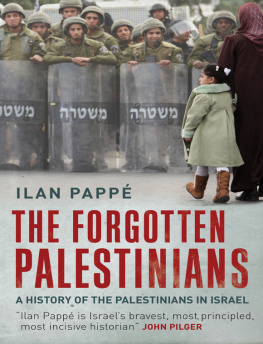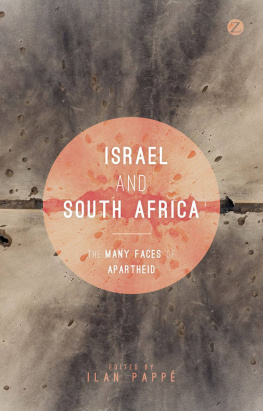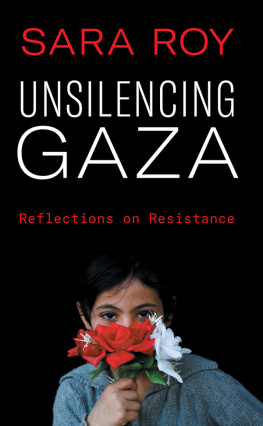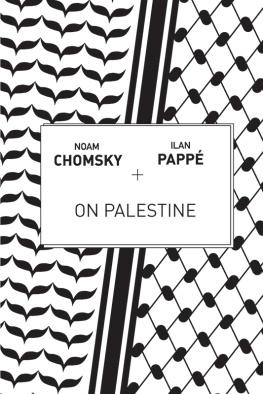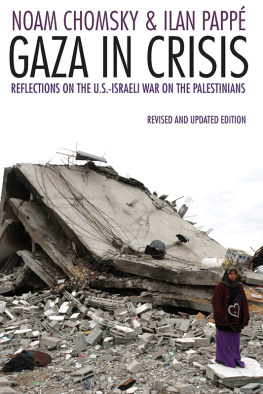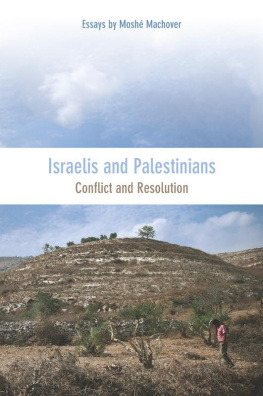THE FORGOTTEN PALESTINIANS
THE FORGOTTEN
PALESTINIANS
A History of the Palestinians in Israel
Ilan Papp
YALE UNIVERSITY PRESS
NEW HAVEN AND LONDON
In memory of the thirteen Palestinian citizens who were shot dead by the Israeli police in October 2000
Copyright 2011 Ilan Papp
The right of Ilan Papp to be identified as author of this work has been asserted by him in accordance with the Copyright, Designs and Patents Act 1988.
All rights reserved. This book may not be reproduced in whole or in part, in any form (beyond that copying permitted by Sections 107 and 108 of the U.S. Copyright Law and except by reviewers for the public press) without written permission from the publishers.
For information about this and other Yale University Press publications, please contact:
U.S. Office:
Europe Office:
Library of Congress Cataloging-in-Publication Data
Papp, Ilan.
Forgotten Palestinians: a history of the Palestinians in Israel / Ilan Papp.
p. cm.
ISBN 978-0-300-13441-4 (cl: alk. paper)
1. Palestinian ArabsIsraelHistory. 2. Arab-Israeli conflictHistory.
3. IsraelEthnic relations. 4. MinoritiesIsrael. I. Title.
DS119.7.P288825 2011
956.94'0049274dc22
2010051045
Set in Janson Text by IDSUK (DataConnection) Ltd
Printed in Great Britain by TJ International, Padstow, Cornwall
A catalogue record for this book is available from the British Library.
2015 2014 2013 2012 2011
10 9 8 7 6 5 4 3 2 1
CONTENTS
And therefore,
If you wish, I will say I am the man
A Pre-Islamic Poet who spread his wings and flew into the desert
And I was a Jew before Jews floated on the Sea of Galilee,
And I was a sun-stricken Arab in the morrow's shift
And I was a rock, an olive tree that remained.
All the country became home, but I was a stranger in it.
I was a Muslim in Jesus' land and a Catholic in the desert.
Not that any of this altered my way of life; only that I have not forgotten
That I was born in the sand, and wandered with the light until I landed
At the shadow of a callous knowledge tree.
I tasted its fruit.
I was eternally excommunicated, unable to return
Like the water that flowed and never returned to the river
Salman Masalha, Final answer to the question
How do you define yourself?
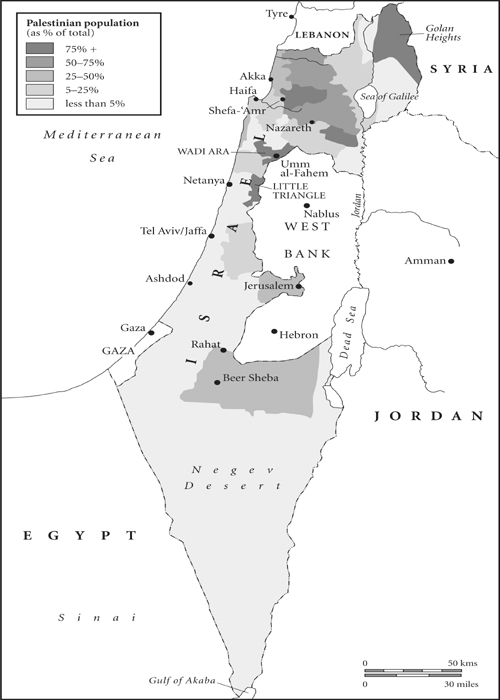
PROLOGUE
HOSTILE ALIENS IN THEIR OWN HOMELAND
THE EARLY ZIONIST settlers were compulsory diarists. They left the historians mountains of travelogues, journals and letters, writing from almost the moment they landed in Palestine, at the very beginning of the twentieth century. The land was unfamiliar and their journey from Eastern Europe was quite often harsh and dangerous. But they were well received, first in Jaffa where small boats took them ashore from their ships and where they looked for their first temporary abode or piece of land. The local Palestinians in most cases offered these newcomers some accommodation and advice on how to cultivate the land, something about which the Zionists had little to no knowledge as they had been barred for centuries from being farmers or landowners in their home countries.
The settlers did not reciprocate in kind; at night, when they wrote the early entries in their diaries by candlelight, they referred to the native Palestinians as aliens roaming the land that belonged to the Jewish people. Some came with the notion that the land was empty and assumed that the people they found there were foreign invaders; others, like the founder of the Zionist movement, Theodor Herzl, knew that Palestine was not a land without people but believed that its native inhabitants could be spirited away to make room for the Jewish return to, and redemption of, Eretz Israel.
The perception of the Palestinians as unwanted and unwelcome has remained a potent part of Zionist discourse and attitude in what became Israel in 1948. More than a century later, the descendants of some of these Palestinians are citizens of the Jewish state, but this status does not protect them from being regarded and treated as a dangerous threat in their own homeland. This attitude permeates the Israeli establishment, and is expressed in various different ways.
The Israeli College for National Security is the local West Point for the most senior officers in the army and the officials in the security services, both for the domestic secret service, the Shabak, and for the famous (or infamous, as the case may be) Mossad. The future heads of the army and these security apparatuses have to graduate from this college, which works very closely with the University of Haifa's Center for National Security Studies and Geostrategy. Year after year they issue papers warning of the threat of Arab takeover of land in the north and south of Israel. Arab here means the Palestinian citizens of Israel. This is the equivalent of the FBI warning the US government that the Native American citizens of the USA are buying flats and houses in increasing numbers.
The report of 2007 declared, the state institutions are terribly worried about the increased attempts by Arab (citizens) to buy land in the Negev and in the Galilee. This particular report was the most ironic of them all. It pointed out that the main efforts in the south to buy private land are made by Bedouin, and in the Galilee by Bedouin and Druze. These are the two communities within the Palestinian community in Israel that are supposed to receive a better treatment since their members serve in the Israel army, while the rest of the Palestinian citizens do not, an exemption often brought up as a pretext for the discrimination against them (although one should note that only a very small minority among the Bedouin in the south serve in the army; the majority of recruits come from the north). Seemingly if you are an Arab, even one serving in the Israeli army, when you buy land you still become the enemy from within.
Mainstream historians who write nostalgically about Israel's first decade regard the takeover of Arab land as the most important national mission to be executed by early governments. A century-old ideology holds that the land of Israel belongs exclusively to the Jewish people and that Judaizing those parts which are still owned by Arabs, and preventing Arabs from buying more land, is a sacred, national and existential task for the survival of the Jewish people. In 2010 the Arabs own about 2.5 per cent of the land and they have been unable to increase that proportion in all the years of Israel's existence, despite the increase in their numbers which Israeli newspaper headlines like to describe as the demographic time bomb.
To be a hostile alien in one's own land not only involves facing daily challenges about the right to own land, it also affects whom one may marry and build a family with. In the dead of night between 23 and 24 January 2007, the village of Jaljulia was encircled by military and police forces. The aim of this siege was to capture eight Palestinian women, originally from the West Bank, who had lived with their husbands for years and had raised families at a time when Israelis encouraged Palestinians from the occupied territories to work as cheap labour in the Jewish state when there was relatively free movement in and out of the West Bank. These women were arrested and expelled back to the West Bank on the same night.
Following this incident, Oded Feller, from the Association for Civil Rights in Israel, wrote to Eli Yishai, the Minister of the Interior:
Next page
